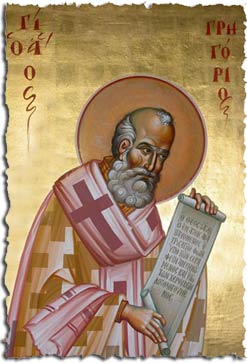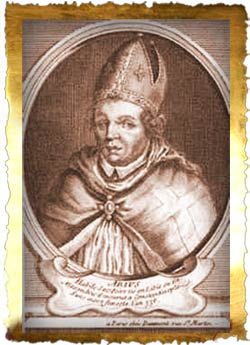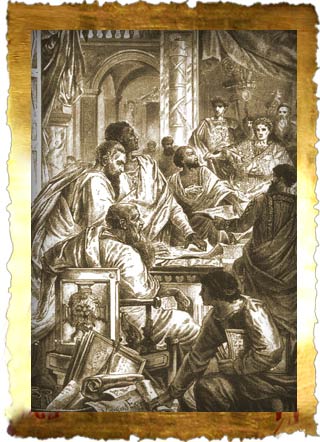Belief in the Trinity Emerged Centuries after Prophet Jesus (pbuh)
| Nyssa'lı Saint Gregory |
Christians believe in the Holy Bible, which consists of the Old Testament and the New Testament. Although these texts have been corrupted, one can still find in them some facts about Christianity, rules about how they are to live, and examples of Christian moral values. However, no Biblical passage mentions belief in the trinity, and neither this word nor one similar to it appears in the New Testament. The New Catholic Encyclopedia states that the trinity was unknown to the first Christians and only assumed this form in the fourth century:
It is difficult, in the second half of the 20th century, to offer a clear, objective, and straightforward account of the revelation, … and the theological elaboration of the mystery of the Trinity. Trinitarian discussion, Roman Catholic as well as other, present a somewhat unsteady silhouette… There is recognition on the part of exegetist and Biblical theologians, including a constantly growing number of Roman Catholics, that one should not speak of Trinitarianism in the New Testament without serious qualification. There is also the closely parallel recognition - that when one does speak of unqualified Trinitarianism, one has moved from the period of Christian origins to say, the last quadrant of the 4th century. It was only then that what might be called the definitive Trinitarian dogma 'one God in three persons' became thoroughly assimilated into Christian life and thought.2
Trinitarianism only became Church dogma in the fourth century. Before that time, there had been lengthy debates between its proponents and its detractors. These debates came to a head at the Council of Nicaea in 325.
The Council of Nicaea (325), the largest gathering of Church officials until that time, brought together more than 300 clergy members from Rome, Asia Minor, Syria, Phoenicia, Palestine, and Egypt. It was called by Roman Emperor Constantine I, who wanted to end this divisive debate for the sake of Byzantium's future and security. At this Council, the belief that constituted the basis of Christianity would be defined for the security of the Empire, according to a decision to be taken by human beings. Saint Gregory of Nyssa describes the ensuing debates in these terms (Surely God is beyond the expressions employed in this extract):
Every corner of Constantinople was full of their discussions: the streets, the market place, the shops of the money-changers, the victuallers. Ask a tradesman how many obols he wants for some article in his shop, and he replies with the disquisition on generated and ungenerated being. Ask the price of bread today and the baker tells you: "The son is subordinate to the father." Ask your servant if the bath is ready and he makes an answer: "The son arose out of nothing." "Great is the only Begotten," declared the Catholics, and the Arians rejoined: "But greater is He that begot."3
Constantine permitted the Empire's Christians considerable freedom of belief and worship, despite the fact that he was not a Christian and continued to protect Rome's traditional pagan beliefs. In his quest to further the empire's interests, he worked for a compromise between, or even a coming together of, all of its various religions, particularly between the cult of Sol Invictus, based on Sun worship, and Christianity. Concerned over how the Christians had embarked on an internal theological debate just when he was trying to bring the religions together, he convened this council. One side were those who believed that Prophet Jesus (pbuh) was God made flesh on Earth. (Surely God is beyond that!) The leader of this group was Athanasius, bishop of Alexandria. On the other side was the celebrated Egyptian priest Arius.
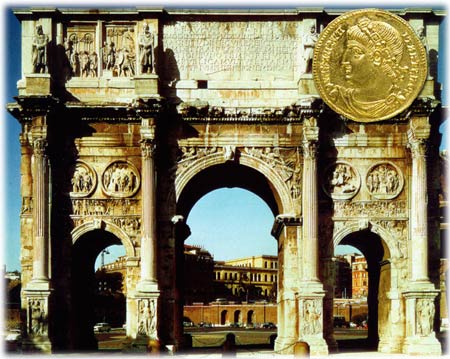
Arius was the son of an Egyptian family of Libyan origins who grew up in Alexandria, one of the most important cities of the time, and joined the Church, becoming a priest in 312. Arius believed in God's oneness and preached that the current Church view of Prophet Jesus (pbuh) as God was mistaken. He said that the title the Son of God used to describe Prophet Jesus (pbuh) was a metaphor and had nothing to do with his supposed divinity. To prove this, he pointed to: Blessed are the peacemakers, for they will be called sons of God (Matthew 5:9). He emphasized that this title applied to everyone who behaved according to God's wishes, and thus could not be limited to Prophet Jesus (pbuh). In one of his works, Arius wrote: "We can all become the sons of God."4 He also pointed to the prayers of Prophet Jesus (pbuh) in the New Testament, which began with "My God," and said that such prayers showed that Prophet Jesus (pbuh) was devoted to God and, like other people, His helpless servant. Arius also noted that in the New Testament Prophet Jesus (pbuh) frequently referred to himself as the son of man, and emphasized that this indicated Prophet Jesus' human nature.
As the priest in residence at Baucalis, a district of Alexandria, Arius communicated these ideas to a wide audience. Due to the consistence and convincing nature of what he said, and also to his modest and simple lifestyle, those who listened to him easily accepted his ideas. However Bishop Alexander of Alexandria, who was loyal to the Church in Rome which regarded Prophet Jesus as the son of God, not in the metaphorical sense, but as a true deity (Surely God is beyond that), became uneasy with such ideas. After failing to convince Arius to alter his opinions, he initiated a fierce assault against him. He described this in his own writings:
This movement has spread ever wider, to all of Egypt, Libya and Upper Thebes. At this, we too met with the bishops of Egypt and Libya, and cursed this movement and all its followers at an assembly of around a hundred people…5
The condemnation was not solely verbal. In 318, Arius and his followers were excommunicated. Arius, his two closest assistants (Bishop Theonas and Secundus), and 12 priests were exiled to Palestine. Before going into exile in Palestine, Arius collected his ideas in a lyrical book called Thalia.
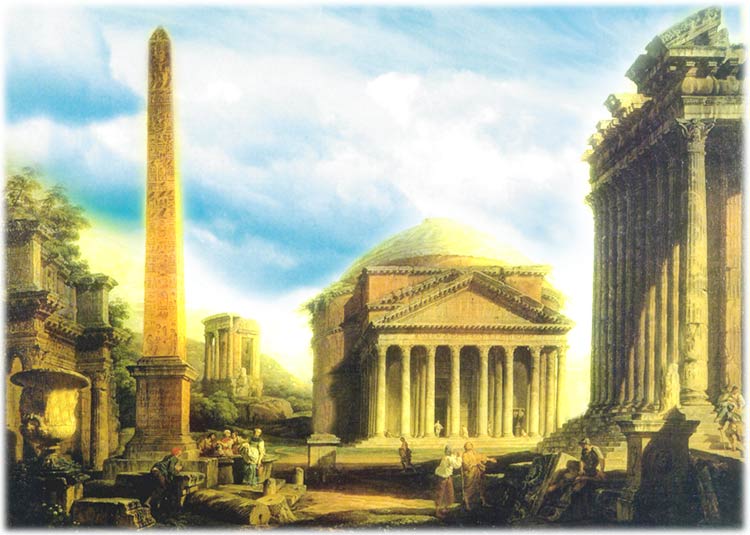
However, here too Arius found sympathizers. And so his movement, which strongly opposed many of the ideas of the Roman Church, continued to spread. When reports of this reached Constantine, who had taken the Church of Rome under his protection in order to build religious unity, he realized that he was dealing with a major problem: internal division of the Church. He therefore decided to re-establish unity without further loss of time. This was why he convened the Council of Nicaea, one of Christianity's major turning points.
The Council of Nicaea
| The Egyptian priest Arius, who opposed belief in the trinity. |
Constantine first sought to resolve the conflict by sending letters to both sides explaining that unity was more important than anything else. When he saw that his letters were not having the desired effect, he decided, at the suggestion of Bishop Hosius, to call a World Church Council, or synod, at Nicaea to give an exact definition of the trinity. Those who rejected this belief were declared heretics.
Although the council members sought to give the impression of a democratic forum, in reality the emperor brought enormous pressure to bear on the participants. Not surprisingly, the side that he supported, the Church of Rome, emerged victorious. Of the 300 or so participating priests, only around 20 were close to Arius. One reason that there were so few priests from the Arian-influenced Eastern Church, was that the council was moved to Nicaea, instead of held in Ankara as originally planned, which was further to the north-west.6In addition, the council took place in the emperor's summer palace located in Nicaea. For that reason, the emperor attended all of the council sessions, and his authority was naturally reflected in the decisions taken.
The Nicene Creed, the clearest and most concrete expression of the alleged deification of Prophet Jesus (pbuh), says: (Surely God is beyond all the expressions follow!):
We believe… in one Lord Jesus Christ, the only begotten of the Father, that is, of the substance [ek tes ousias] of the Father, God of God, light of light, true God of true God, begotten not made, of the same substance with the Father [homoousion to patri], through whom all things were made both in heaven and on earth; who for us men and our salvation descended, was incarnate, and was made man, suffered and rose again the third day, ascended into heaven and cometh to judge the living and the dead. And in the Holy Spirit. Those who say: There was a time when He was not, and He was not before He was begotten; and that He was made out of nothing (ex ouk onton); or who maintain that He is of another hypostasis or another substance [than the Father], or that the Son of God is created, or mutable, or subject to change, [them] the Catholic Church anathematizes.7
| The Council of Nicaea ended in favor of the trinitarians after Emperor Constantine threw his weight behind them. |
The first paragraph clearly denies Arianism. The Church of Rome, which awarded itself the title of Catholic (Universal) Church, declared the Arians and those who shared the same views to be heretics.
From this time on, the Nicene Creed became the basis of the Christian faith, and those who opposed it were considered heretics. The Roman Catholic Church declared that "God has manifested His will in this council" for which reason the Nicene Creed was regarded as a sacred and infallible text, just like a revelation. But in reality, this was nothing more than the Church of Rome asserting its will.
Following the council, the Arianis came under great pressure, and supporters of Arius who refused to sign the Nicene Creed were anathematized. However, they held out for another 50 years or so, before gradually withdrawing from the stage of history toward the end of the fourth century due to continued Church repression. Yet objections to the official Nicene Creed continued, which meant that more councils had to be held to debate the new ideas being put forward. Despite all of the arguments, however, the superstitious belief in One in Three and Three in One was never attacked. (This superstitious belief referred to God having three different identities, all of which were equal, infinite and in common.) During Constantine's reign, not only were such beliefs as the Nicene Creed expanded, but the New Testament also assumed its current form. No complete version of the New Testament in our possession today is any older than the time of Constantine.8
Throughout the 50 years that followed the Council of Nicaea, Athanasius defended and further developed the Nicene formula, because the belief in the trinity had not yet assumed its final form. The third member of the trinity, the Holy Spirit, remained vague. In the fourth century, a second general council chaired by Macedonius, Patriarch of Constantinople, met in the city (modern-day Istanbul). At its conclusion, the council declared that the Holy Spirit was the third member of the trinity, and that all three members were equal in terms of greatness.9(Surely God is beyond all that!) Therefore, trinitarianism assumed its final form only four centuries after Prophet Jesus (pbuh) was raised to God's presence. At this council, another belief not found in the Bible was put forward: homoousion, that the trinity's three members had the same essence and equal powers. (Surely God is beyond that!)
Another important matter is how belief in the trinity was first put forward.
Among Christians, belief in the trinity is generally seen as being difficult to comprehend and impossible to understand, but one that must absolutely be accepted. The reason for this is that the proponents of the trinity also claim to be monotheists. Yet it is clear that no Christian has ever been able to explain how trinitarianism and monotheism can exist together. The questions arising in people's minds have not been satisfactorily answered. Neither is it possible for them to be. Therefore, they maintain that the trinity is an article of faith that does not need to be thought about or understood, for it must be accepted as it stands.10For hundreds of years, this has prevented any serious discussion on this belief's clear errors and inconsistencies. To summarize: Belief in the trinity is a matter of blind faith concerning which any debate or discussion is prohibited.
Many Biblical scholars describe the period between Prophet Jesus (pbuh) being raised to God's presence and the Council of Constantinople as the deification of Prophet Jesus (pbuh), the messenger of God. This theological concept went through a number of specific stages, at the end of which it was assumed that Prophet Jesus (pbuh) was divine. (Surely God is beyond that!) This process will be examined in more detail in later chapters.

DİPNOTLAR
2. The New Catholic Encyclopedia, cilt XIV, s. 295, http://www.triumphpro.com/trinity_disproved_2(word6).htm
3. Muhammed Ata'ur Rahim and Ahmad Thomson, Jesus Prophet of Islam, Revised Edition, Ta-Ha Publishers Ltd, Kasım 1996, Londra, s. 93
4. Fazal Ahmad, "Arius: The Trinity Controversy in the Church", The Review of Religions, Londra, Eylül 1996
5. Athanas., Hist. Tr.; P Johnson. History of Christianity, Pelican Books 1976, s. 89
6. Fazal Ahmad, "Arius: The Trinity Controversy in the Church", The Review of Religions
7. "The First Council of Nicaea", The Catholic Encyclopedia, copyright © 1913 by the Encyclopedia Press, Inc. Electronic version copyright © 1996 by New Advent, Inc. http://www.newadvent.org/cathen/11044a.htm
8. Michael Baigent, Richard Leigh, Henry Lincoln, The Messianic Legacy, Corgi Books, London, 1991. s. 66
9. Prof. Dr. Mehmet Aydın, Müslümanların Hristiyanlara Karşı Yazdığı Reddiyeler ve Tartışma Konuları, Türkiye Diyanet Vakfı Yayınları, Ankara 1998, s. 96
10. Mahmut Aydın, İsa Tanrı mı İnsan mı?, Dinler Arası Diyalog Bağlamında İsa-Mesih'in Konumu Sorunu, İz Yayıncılık, s. 47
- Introduction
- Christians' errors regarding the trinity
- The Qur'an rejects belief in the trinity
- Belief in the trinity emerged centuries after Prophet Jesus (pbuh)
- Prophet Jesus (pbuh) is God's Prophet, not his son
- True Christianity in the new testament
- Prophet Jesus (pbuh), the Prophet of God described in the new testament
- The authors of the four gospels never met Prophet Jesus (pbuh)
- Why might the Christians have made this groundless claim?
- Christians opposed to the trinity from nicaea to the present day
- Conclusion

